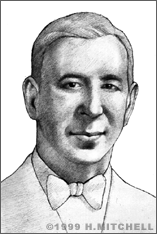Rube Goldberg
Rube Goldberg was an inventor of the absurd, a social critic who used cartoons to point out the plight of people caught up in an overly complicated world.
Reuben Lucius Goldberg was born in San Francisco in 1883. He majored in engineering at the University of California at his father's insistence, and after graduating, he worked for the Water and Sewers Department of his home town.
But Goldberg did not enjoy his job; he loved to draw and wanted to be an artist. He quit his job and found work at a local newspaper, where he eventually managed to have some of his cartoons published. His reputation soon won him a position in New York, as a staff cartoonist for the Evening Mail.
All of Goldberg's cartoons, which treated sports, politics, and social life, were popular. In fact, he won a Pulitzer Prize in 1948 for a drawing that expressed a stark skepticism about the atomic bomb as a means of peacekeeping. But most of all, Goldberg became famous for his dozens, if not hundreds, of "Invention" cartoons.
In these, Goldberg put his talents in engineering to an unpredictable use: he created and annotated, in painstaking detail, utterly complicated and outlandish mechanisms that performed what should have been simple, straightforward tasks. His intention was to point out, in a humorous way, "man's capacity for exerting maximum effort to accomplish minimum results."
A Goldberg "invention" is not easy to describe in less than a couple hundred words, but a quick view of even one of them makes their spirit plain. One can see from his devices that Goldberg, despite or because of his training, was actually rather leery of technology. The "works" of his inventions tend to be composed of sunlight, running water, plants, and pets more often than mechanical devices. Thus, Goldberg was spoofing modern Americans' romance with technology as well as their refusal to do things simply.
Another important feature of Goldberg's inventions is that they all do in fact work (some, weather permitting). That is, they are practicable though impractical. Above all, they are memorable, in spirit if not in detail.
Rube Goldberg was already a cultural hero when he died in 1970, and he has left a tremendous legacy. Very few modern people have seen their name become an adjective, as "Rube Goldberg" is used to describe any convoluted, overcomplicated system (heard perhaps most often in the phrase, "our Rube Goldberg Tax Code"). In addition, Goldberg was honored with a postage stamp.
Most importantly, there are hundreds of "Rube Goldberg Invention Contests" held in the U.S. every year, culminating in the National Championship at Purdue University. Add to all of this the innumerable websites devoted to him, and it is clear that Rube Goldberg, in a slightly backhanded but good-humored way, has done as much as anyone to promote the idea of invention as fun.


